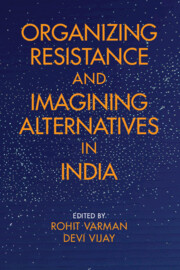Book contents
7 - People’s Archive of Rural India (PARI) as an Alternative to Corporatized Media: The Public Sphere and Rural Silencing in India
Published online by Cambridge University Press: 30 June 2022
Summary
This chapter discusses People's Archive of Rural India (PARI), an open-source digital archive and a living journal dedicated to rural India. We situate PARI within the broader canvas of transformations in Indian media, especially since the 1990s. This transformation, marked by corporatization and commodification of media houses, has had a pronounced degrading effect on representations of the rural poor. Indeed, any meaningful representation of rural India is erased from the press and from deliberative democratic spaces in India. We trace how PARI attends to this gaping wound in Indian democracy by enabling rich and plural representations of and by the subaltern. In so doing, PARI partially resurrects this crumbling fourth pillar of democracy and creates an alternative imagination.
Several scholars have discussed the perverse effects of neoliberal tendencies on the structure and logic of media and journalism in India (Guha Thakurta, 2014; Guha Thakurta and Chaturvedi, 2012; Mudgal, 2011, 2015). While there is consensus among the experts and researchers working on rural India that the majority of the population is going through prolonged and severe distress (Chandra, 2010; Patnaik, 2013; Sainath, 2011), the crises, issues, and challenges of rural India are almost absent in India's leading newspapers (Mudgal, 2011). Moreover, media houses have removed or reduced the number of rural correspondents. In its present neoliberal logic, the media is more interested in covering breaking news to increase its viewership than covering underlying structural processes of inequality and poverty. Consider how Tamil Nadu's farmers travelled to New Delhi and adopted extreme measures, such as carrying skulls of farmers who had committed suicide, in order to draw some attention to their plight from the ruling classes. Similarly, the 165-kilometre ‘Long March’ by Maharashtra's farmers remained unreported until it reached Mumbai. These instances provide a glimpse of the extraordinary crises in large swathes of India (see also Khare and Varman, 2016, 2017; Varman and Vikas, 2007). The vast majority of those residing in rural India are silenced and excluded in the already shrinking democratic sphere.
In this chapter, we discuss the role of media in a democracy and the repercussions when the media, an important institution of democracy, is driven by the neoliberal agenda.
- Type
- Chapter
- Information
- Organizing Resistance and Imagining Alternatives in India , pp. 213 - 240Publisher: Cambridge University PressPrint publication year: 2022

